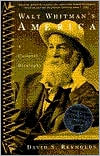

 |

|

The average rating for Walt Whitman's America: A Cultural Biography based on 2 reviews is 5 stars.
Review # 1 was written on 2012-08-26 00:00:00 Robin Datta Robin DattaThis is one of the best books of its type that I have ever read. The scholarship that went into the writing of this book is just incredible. It is called a cultural biography, and examines Whitman's life experience and the culture in which he lived as influences on his poetry. Whitman lived in Brooklyn, N.Y. for most of his life, and, by going to Manhattan had access to all of the great cultural trends of his time. His life is examined through his interfacing with politics, sociology, the arts, economics, religion, education, etc.. Through this careful examination, you get a pretty good idea of what was important in life for Whitman, and also the 19th century American, and what they were experiencing in the years before and after the Civil War. For one example, I had a generic idea, but never realized how much Americans of that time were fascinated by great oration. Henry Ward Beecher, Frederick Douglass, Stephen Douglas, and Abraham Lincoln, to name a few, were known for their dynamic ability in oratory, and were basically put into the same category as entertainers. There are hundreds of fascinating examples of illuminating information that I could pull from the book. Suffice it to say that I highly recommend this book to anyone who is interested in American History...oh yes, also in Walt Whitman's poetry! No book that I have ever read has put the world of 19th century America into such good perspective for me. |
Review # 2 was written on 2015-01-10 00:00:00 Junichi Saito Junichi SaitoReynolds shows how Whitman was of his culture and why he is an authentic American voice. Whitman gave the new country a new poetry, a poetry that broke the bounds of format and content. He gave poetry zest, a proud "I" and what we consider today, a healthy view of the body and sex. The cultural biography concept is most appropriate for this poet. Reynolds draws the picture of the world that shaped Whitman, and then the greatly changed world following the Civil War. Following President Polk, the nation seemed to be drifting. There was economic and political turmoil. The long festering problem of slavery was coming to a boil. It was in this period that Whitman did the work we remember him for. Reynolds reminds us that in Whitman's time, the continued unification of the states was not a settled issue. Whitman wrote of the unity of all the people and parts of the country. He wrote that he was a poet for slave and master, the man and the woman. The poems, as Reynolds shows, were only one side of Whitman. Many, who know him only as an icon would be surprised by this views on race, on capitalism and how he managed his image. This book is well researched. The author develops and presents his ideas with clarity. It is not for everyone. It's long and, while it is well written, it might not sustain your interest unless you have an interest in Whitman or the culture of his time(s). |
CAN'T FIND WHAT YOU'RE LOOKING FOR? CLICK HERE!!!